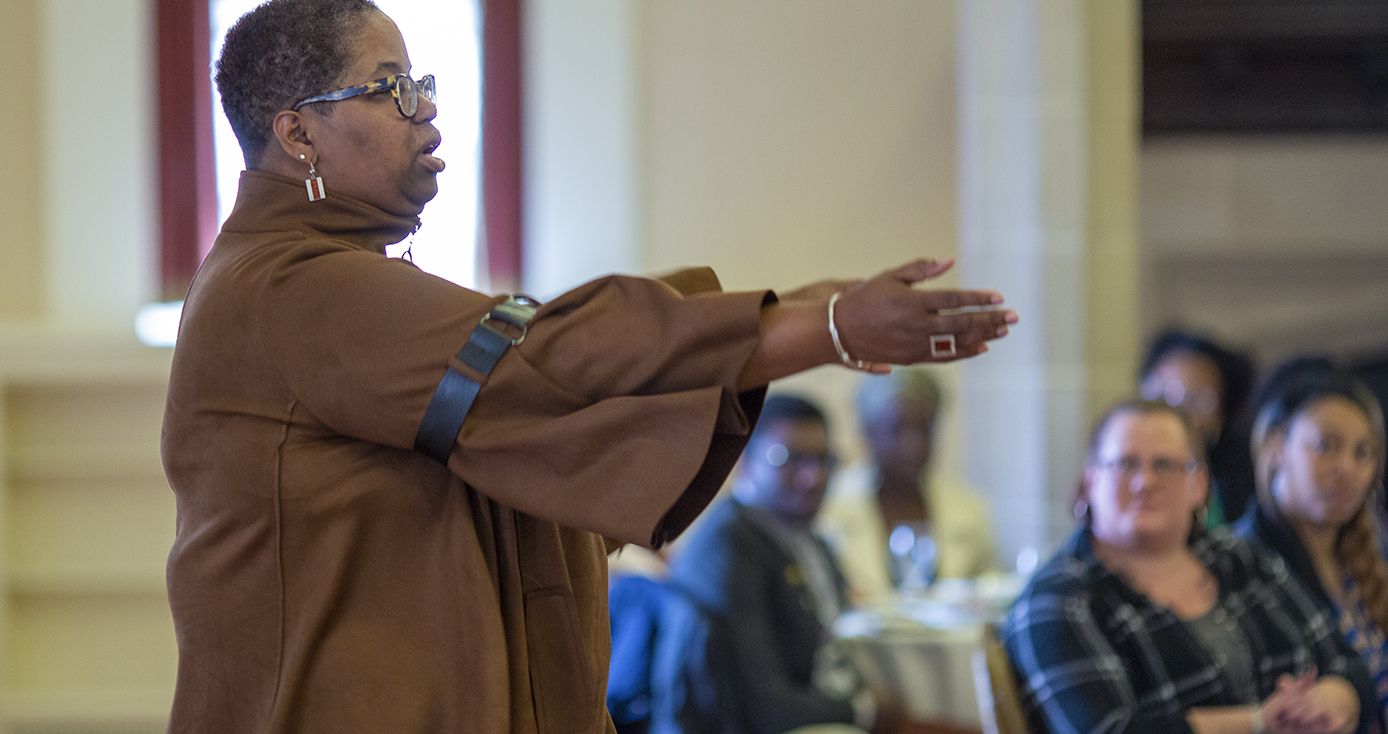
Subscribe to Pittwire Today
Get the most interesting and important stories from the University of Pittsburgh.Shedding Light on the Imperfect Path
Stephanie Adams’ journey to becoming a university dean wasn’t linear. She wound around obstacles, diverged from her path and even left college—twice.
In celebration of Black History Month, a month that looks back at history to recognize the road ahead, Adams, dean of the Eric Jonsson School of Engineering and Computer Science at the University of Texas at Dallas, shared her career path in a lecture on Feb. 25 hosted by the University of Pittsburgh’s Swanson School of Engineering Office of Diversity and Pitt STRIVE.
“I think it’s important for young people to know when you see professors in front of you in class that there’s a backstory,” said Adams. “And oftentimes, we don’t tell the backstory.”
Adams’ career has included stops in industry, academia, consulting and government, with a plethora of impressive titles and accomplishments. Throughout the lecture, “College Dropout to Dean: Wouldn’t Take Nothing for My Journey,” Adams revealed that in the spaces between the lines on her resume are two college drop-outs, low SAT scores that prevented her from attending her first-choice college and a three-month hiatus from a job to deal with the psychological toll it was taking on her.
“So many of us get paralyzed by fear. We’re afraid of failure,” she said. “But when I go to interviews, and people say, ‘Talk about a time you failed,’ I tell them I didn’t fail. This thing didn’t work out, but that doesn’t mean I failed.”
The importance of a personal story
For Isreal Williams, a senior studying industrial engineering at the University of Pittsburgh’s Swanson School of Engineering, hearing mentors willing to share their struggles like Adams did in her Pitt appearance has been pivotal to his journey. Becoming such a mentor and teaching others to do the same has become the cornerstone of his early career path in his role in Future Kings Mentoring.
Future Kings, which won the 2019 T-Mobile Changemakers Competition, will begin admitting the first group of 20 students, from 8th to 12th grade, this summer to teach them leadership and financial literacy skills as well as cultural history. Williams' friends Terrell Galloway and Sean Spencer approached him with the idea for a mentoring program for young black men in Pittsburgh several years ago, noting the lack of male mentors the three of them had in their lives. The group seeks to give mentees a sense of identity and purpose while exploring their own future career paths.
“A good mentor is someone who listens and doesn’t assume they know what you want and what’s best for you, but it’s also someone who knows you well enough to remind you of what you want and what’s important,” said Williams. “It’s someone who can push you and coach you and ask you to move forward.”
Williams, who grew up with his mom Angela Williams on the North Side of Pittsburgh, came home from school in the third grade and told her that he wanted to go to a more challenging school. He rarely had homework, and his classes were too easy for him. Through the Fund for Advancement of Minorities Through Education (FAME), Williams was able to transfer to St. Edmund’s Academy in Squirrel Hill. But switching schools meant an adjustment beyond the more difficult classes.
“At home, everyone looked like me,” he said. “It wasn’t until I got to St. Edmund’s that I realized there were cultural differences. All the FAME kids sat together in the cafeteria. When other kids got picked up after school, I’d take my backpack and saxophone and get on two buses to get home. But it was just the way it was.”
Though his new school gave him opportunities to study things he otherwise wouldn’t have been able to study, the lack of a mentor left him feeling directionless. While friends were lining up internships and plans before they even graduated high school, Williams was still unsure of what he wanted to do. At his mom’s suggestion, Williams was able to explore engineering as a career. Through the Swanson School’s INVESTING NOW, a college preparatory program for students historically underrepresented in STEM fields at Pitt, he got to see it up close and eventually chose to pursue it.
But when things got difficult, it was finding a mentor that helped push him through. Michael Kennedy, a friend of his mother’s and an engineer who encouraged Williams to pursue the field, admitted to him that he struggled with some of the same challenges that Williams was facing, so much so that he took some time away from school before finishing his degree. Kennedy’s willingness to speak candidly about the difficulties he faced in achieving success made it feel attainable.
“Hearing things like that from someone so successful is game-changing,” said Williams. “Sometimes things happen, paths aren’t linear, and it’s okay to struggle. It doesn’t mean you’re not capable of succeeding.”



